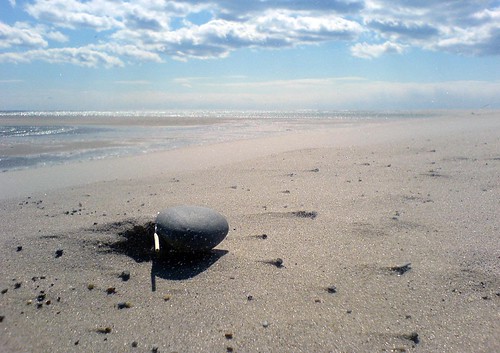Book review: The outermost house by Henry Beston
Henry Beston decided to try to live a full year in a tiny cottage on the sand dunes of Cape Cod, that little shoe-like stretch of land that juts out below Boston on North America's East Coast and frequently battered by stormy Nor'Easters. This was in 1926, and his only human companions were the people at the Coast Guard Stations, who walked the beach nightly to look for ships in distress, since this is a famously disastrous coastline with many sandbars, bad weather, and stormy skies. But the ships and people form only a small part of his diary, which is probably among the best nature writing I have read in English.
He describes, feels, and paints with words the migration of the seabirds, the swallows in the air, insect life, stranded fishes, and grassy dunes. Straightforward, gorgeous, and filled with impressionistic sentences, this is a wonderful book to read. Beston describes a different time, without phones and regular transportation, but the same birds are still flying north every spring, and the same beach plums are ripening in September.
I got my 1949 edition on Bookmooch, but this title is still in print. It is considered a classic, but I have read many classics that don't live up to becoming my own classic books. This one is far beyond classic.
Beston's cottage and land was given to the Audobon Society in 1960, and was finally reclaimed by the sea in 1978, when the storms had eroded the beach so much that the house was swept away during a big winterstorm.
Here are just a few examples from the book:
He describes, feels, and paints with words the migration of the seabirds, the swallows in the air, insect life, stranded fishes, and grassy dunes. Straightforward, gorgeous, and filled with impressionistic sentences, this is a wonderful book to read. Beston describes a different time, without phones and regular transportation, but the same birds are still flying north every spring, and the same beach plums are ripening in September.
I got my 1949 edition on Bookmooch, but this title is still in print. It is considered a classic, but I have read many classics that don't live up to becoming my own classic books. This one is far beyond classic.
Beston's cottage and land was given to the Audobon Society in 1960, and was finally reclaimed by the sea in 1978, when the storms had eroded the beach so much that the house was swept away during a big winterstorm.
(Cape Cod Beach Sandstorm in April by Bob Gaffney on Flickr)
Here are just a few examples from the book:
[Beston's foreword] "Nature is a part of our humanity, and without some awareness and experience of that divine mystery man ceases to be man. When the Pleiades and the wind in the grass are no longer a part of the human spirit, a part of very flesh and bone, man becomes, as it were, a kind of cosmic outlaw, having neither the completeness and integrity of the animal nor the birthright of a true humanity."
[autumn, ocean and birds] "For the animal shall not be measured by man. In a world older and more complete than ours they move finished and complete, gifted with extensions of the senses we have lost or never attained, living by voices we shall never hear. They are not brethren, they are not underlings; they are other nations, caught with ourselves in the net of life and time, fellow prisoners of the splendour and travail of the earth. "
[autumn, ocean and birds] "For the animal shall not be measured by man. In a world older and more complete than ours they move finished and complete, gifted with extensions of the senses we have lost or never attained, living by voices we shall never hear. They are not brethren, they are not underlings; they are other nations, caught with ourselves in the net of life and time, fellow prisoners of the splendour and travail of the earth. "
[midvinter] "A year indoors is a journey along a paper calendar; a year in outer nature is the accomplishment of a tremendous ritual. To share in it, one must have a knowledge of the pilgrimages of the sun, and something of that natural sense of him and feeling for him which made even the most primitive people mark the summer limits of his advance and the last December ebb of his decline."
[midvinter] "Animal life has disappeared into the chill air, the heavy, lifeless sand. On the surface, nothing remains of the insect world. That multiplicity of insect tracks, those fantastic ribbons which grasshoppers, promenading flies, spiders, and beetles printed on the dunes as they went about their hungry and mysterious purposes, have come to an end in this world and left it all the poorer."






2 comments:
Hello Flickr friend. This has been one of my vave books for years. Nice review.
Thanks Jody! I am glad it is one of your favorite books too.
Post a Comment